Analysis of Ethical Beliefs: Technology, Ethics, and Society
VerifiedAdded on 2023/05/29
|6
|787
|378
Essay
AI Summary
This essay provides a comprehensive analysis of ethical beliefs concerning technology, emphasizing the importance of honesty, personal cyber space, and consideration of downstream risks. It addresses the critical issue of cyber bullying and highlights ethical beliefs such as contributing to society, avoiding harm, honoring property rights, and respecting privacy. Furthermore, the essay differentiates between ethical and legal issues, explaining that legal standards are enforced by governmental laws, while ethical standards are based on human principles of right and wrong. The document underscores the significance of ethical conduct in technology use and its broader implications for society, inviting students to explore more resources on Desklib for further understanding and academic support.
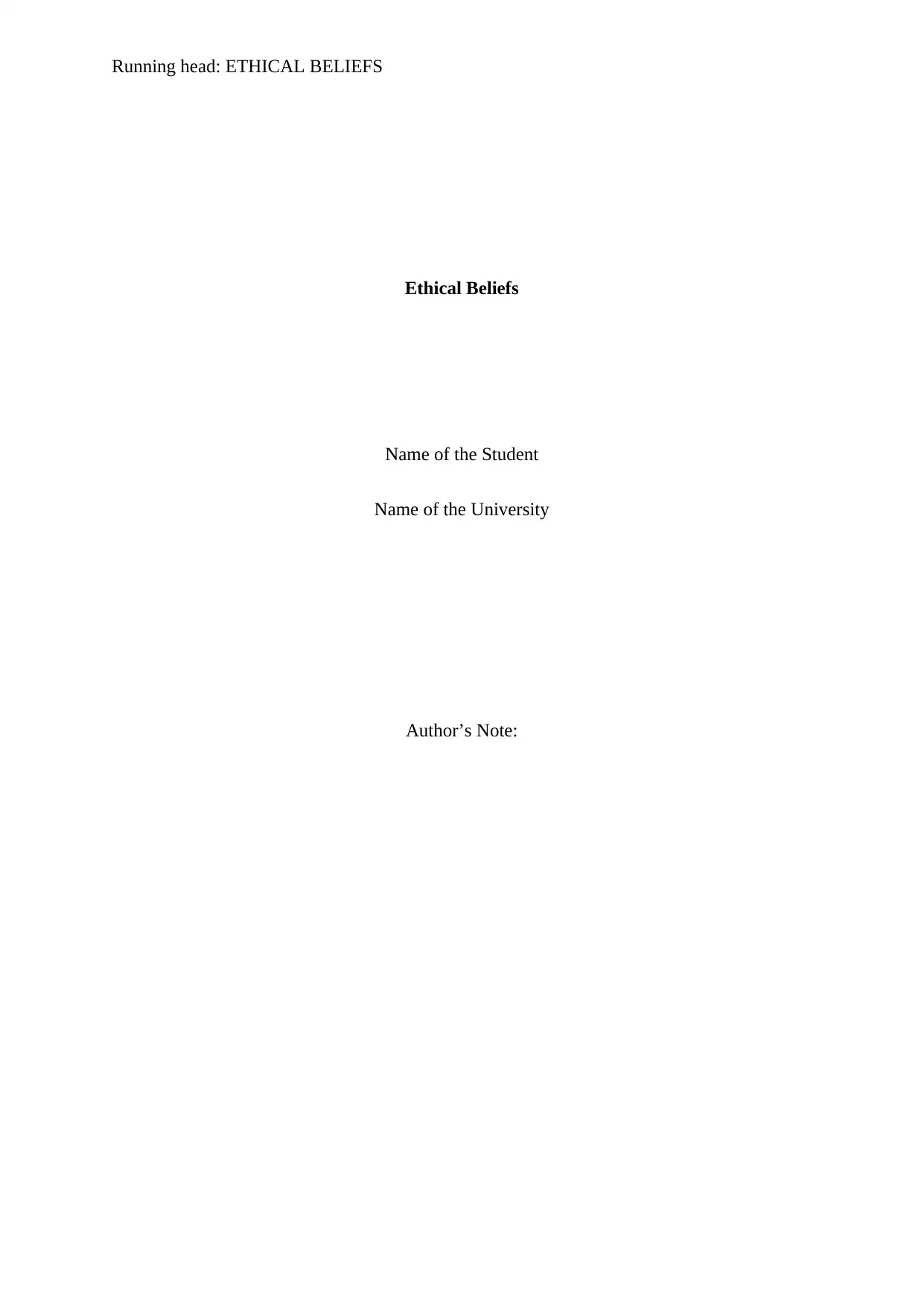
Running head: ETHICAL BELIEFS
Ethical Beliefs
Name of the Student
Name of the University
Author’s Note:
Ethical Beliefs
Name of the Student
Name of the University
Author’s Note:
Paraphrase This Document
Need a fresh take? Get an instant paraphrase of this document with our AI Paraphraser

1
ETHICAL BELIEFS
Table of Contents
Question 1..................................................................................................................................2
Question 2..................................................................................................................................3
Question 3..................................................................................................................................4
References..................................................................................................................................5
ETHICAL BELIEFS
Table of Contents
Question 1..................................................................................................................................2
Question 2..................................................................................................................................3
Question 3..................................................................................................................................4
References..................................................................................................................................5
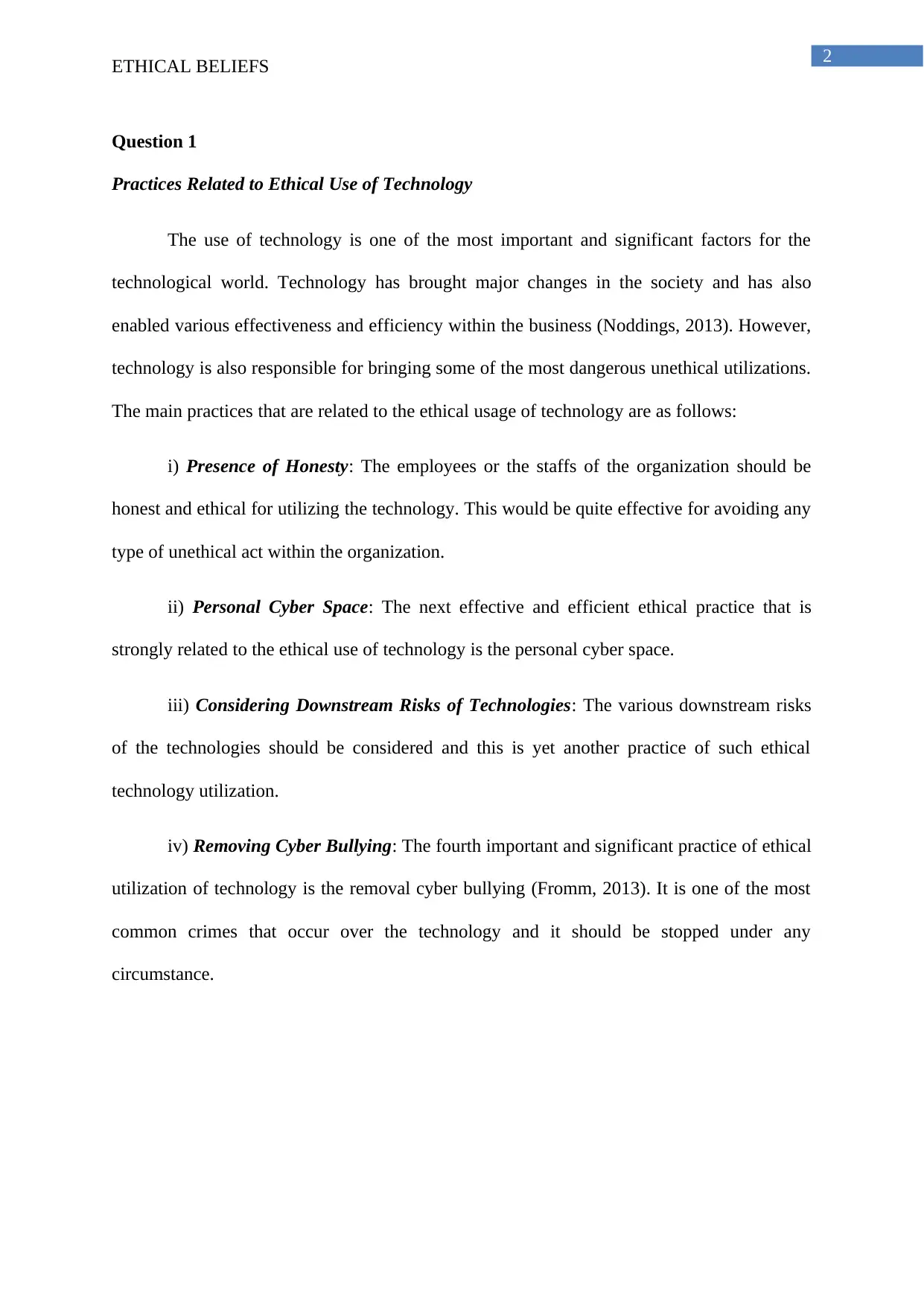
2
ETHICAL BELIEFS
Question 1
Practices Related to Ethical Use of Technology
The use of technology is one of the most important and significant factors for the
technological world. Technology has brought major changes in the society and has also
enabled various effectiveness and efficiency within the business (Noddings, 2013). However,
technology is also responsible for bringing some of the most dangerous unethical utilizations.
The main practices that are related to the ethical usage of technology are as follows:
i) Presence of Honesty: The employees or the staffs of the organization should be
honest and ethical for utilizing the technology. This would be quite effective for avoiding any
type of unethical act within the organization.
ii) Personal Cyber Space: The next effective and efficient ethical practice that is
strongly related to the ethical use of technology is the personal cyber space.
iii) Considering Downstream Risks of Technologies: The various downstream risks
of the technologies should be considered and this is yet another practice of such ethical
technology utilization.
iv) Removing Cyber Bullying: The fourth important and significant practice of ethical
utilization of technology is the removal cyber bullying (Fromm, 2013). It is one of the most
common crimes that occur over the technology and it should be stopped under any
circumstance.
ETHICAL BELIEFS
Question 1
Practices Related to Ethical Use of Technology
The use of technology is one of the most important and significant factors for the
technological world. Technology has brought major changes in the society and has also
enabled various effectiveness and efficiency within the business (Noddings, 2013). However,
technology is also responsible for bringing some of the most dangerous unethical utilizations.
The main practices that are related to the ethical usage of technology are as follows:
i) Presence of Honesty: The employees or the staffs of the organization should be
honest and ethical for utilizing the technology. This would be quite effective for avoiding any
type of unethical act within the organization.
ii) Personal Cyber Space: The next effective and efficient ethical practice that is
strongly related to the ethical use of technology is the personal cyber space.
iii) Considering Downstream Risks of Technologies: The various downstream risks
of the technologies should be considered and this is yet another practice of such ethical
technology utilization.
iv) Removing Cyber Bullying: The fourth important and significant practice of ethical
utilization of technology is the removal cyber bullying (Fromm, 2013). It is one of the most
common crimes that occur over the technology and it should be stopped under any
circumstance.
⊘ This is a preview!⊘
Do you want full access?
Subscribe today to unlock all pages.

Trusted by 1+ million students worldwide
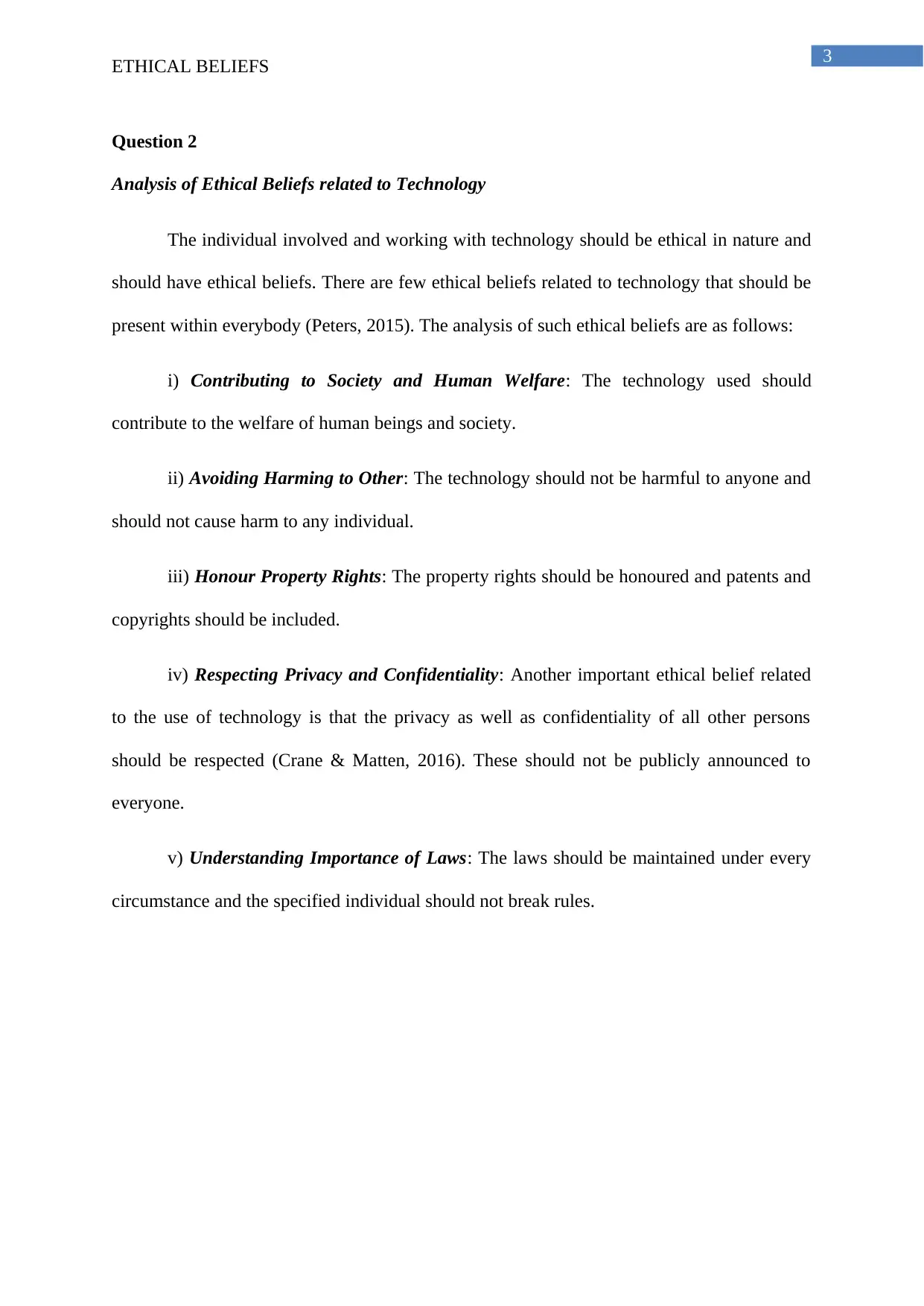
3
ETHICAL BELIEFS
Question 2
Analysis of Ethical Beliefs related to Technology
The individual involved and working with technology should be ethical in nature and
should have ethical beliefs. There are few ethical beliefs related to technology that should be
present within everybody (Peters, 2015). The analysis of such ethical beliefs are as follows:
i) Contributing to Society and Human Welfare: The technology used should
contribute to the welfare of human beings and society.
ii) Avoiding Harming to Other: The technology should not be harmful to anyone and
should not cause harm to any individual.
iii) Honour Property Rights: The property rights should be honoured and patents and
copyrights should be included.
iv) Respecting Privacy and Confidentiality: Another important ethical belief related
to the use of technology is that the privacy as well as confidentiality of all other persons
should be respected (Crane & Matten, 2016). These should not be publicly announced to
everyone.
v) Understanding Importance of Laws: The laws should be maintained under every
circumstance and the specified individual should not break rules.
ETHICAL BELIEFS
Question 2
Analysis of Ethical Beliefs related to Technology
The individual involved and working with technology should be ethical in nature and
should have ethical beliefs. There are few ethical beliefs related to technology that should be
present within everybody (Peters, 2015). The analysis of such ethical beliefs are as follows:
i) Contributing to Society and Human Welfare: The technology used should
contribute to the welfare of human beings and society.
ii) Avoiding Harming to Other: The technology should not be harmful to anyone and
should not cause harm to any individual.
iii) Honour Property Rights: The property rights should be honoured and patents and
copyrights should be included.
iv) Respecting Privacy and Confidentiality: Another important ethical belief related
to the use of technology is that the privacy as well as confidentiality of all other persons
should be respected (Crane & Matten, 2016). These should not be publicly announced to
everyone.
v) Understanding Importance of Laws: The laws should be maintained under every
circumstance and the specified individual should not break rules.
Paraphrase This Document
Need a fresh take? Get an instant paraphrase of this document with our AI Paraphraser
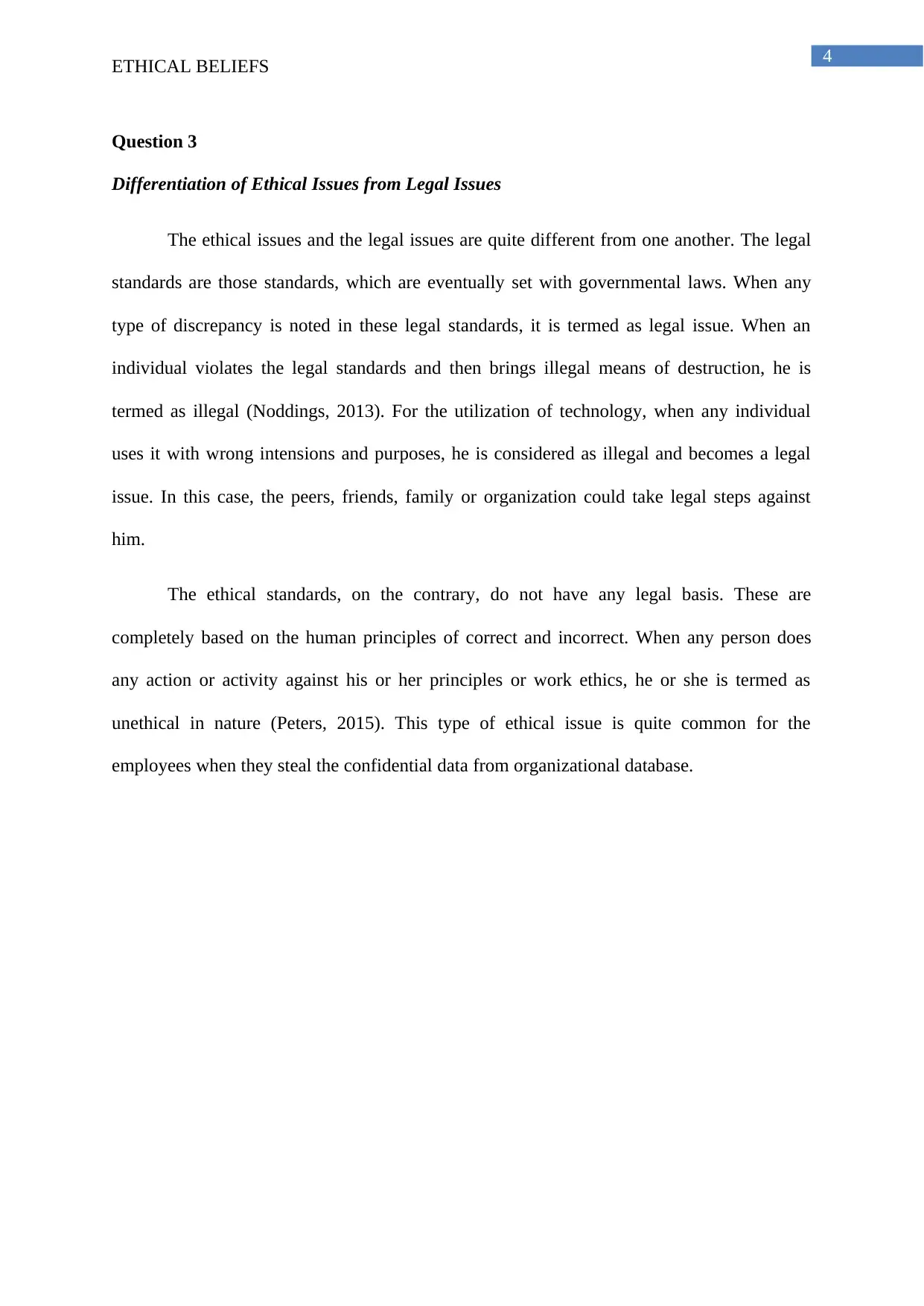
4
ETHICAL BELIEFS
Question 3
Differentiation of Ethical Issues from Legal Issues
The ethical issues and the legal issues are quite different from one another. The legal
standards are those standards, which are eventually set with governmental laws. When any
type of discrepancy is noted in these legal standards, it is termed as legal issue. When an
individual violates the legal standards and then brings illegal means of destruction, he is
termed as illegal (Noddings, 2013). For the utilization of technology, when any individual
uses it with wrong intensions and purposes, he is considered as illegal and becomes a legal
issue. In this case, the peers, friends, family or organization could take legal steps against
him.
The ethical standards, on the contrary, do not have any legal basis. These are
completely based on the human principles of correct and incorrect. When any person does
any action or activity against his or her principles or work ethics, he or she is termed as
unethical in nature (Peters, 2015). This type of ethical issue is quite common for the
employees when they steal the confidential data from organizational database.
ETHICAL BELIEFS
Question 3
Differentiation of Ethical Issues from Legal Issues
The ethical issues and the legal issues are quite different from one another. The legal
standards are those standards, which are eventually set with governmental laws. When any
type of discrepancy is noted in these legal standards, it is termed as legal issue. When an
individual violates the legal standards and then brings illegal means of destruction, he is
termed as illegal (Noddings, 2013). For the utilization of technology, when any individual
uses it with wrong intensions and purposes, he is considered as illegal and becomes a legal
issue. In this case, the peers, friends, family or organization could take legal steps against
him.
The ethical standards, on the contrary, do not have any legal basis. These are
completely based on the human principles of correct and incorrect. When any person does
any action or activity against his or her principles or work ethics, he or she is termed as
unethical in nature (Peters, 2015). This type of ethical issue is quite common for the
employees when they steal the confidential data from organizational database.
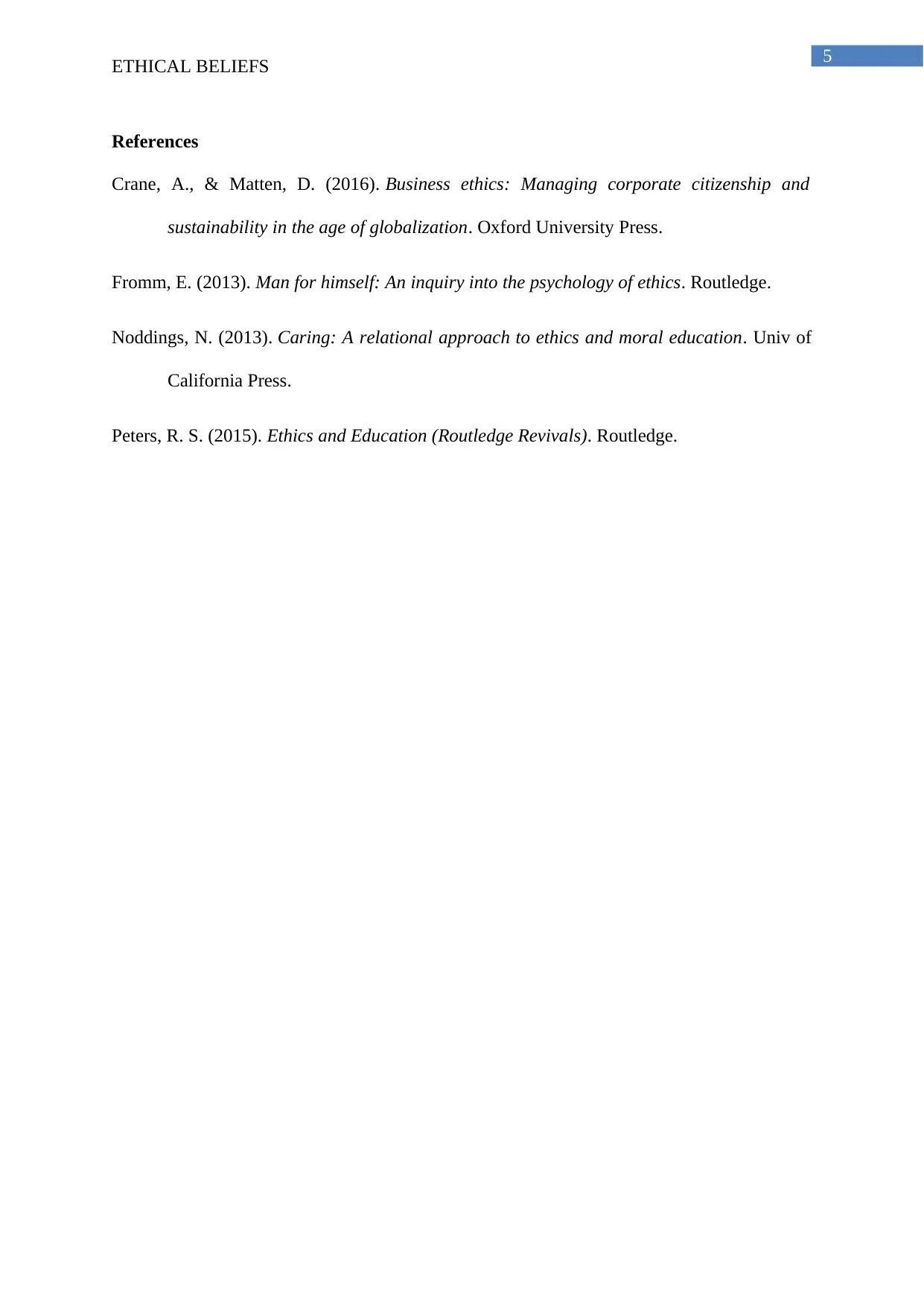
5
ETHICAL BELIEFS
References
Crane, A., & Matten, D. (2016). Business ethics: Managing corporate citizenship and
sustainability in the age of globalization. Oxford University Press.
Fromm, E. (2013). Man for himself: An inquiry into the psychology of ethics. Routledge.
Noddings, N. (2013). Caring: A relational approach to ethics and moral education. Univ of
California Press.
Peters, R. S. (2015). Ethics and Education (Routledge Revivals). Routledge.
ETHICAL BELIEFS
References
Crane, A., & Matten, D. (2016). Business ethics: Managing corporate citizenship and
sustainability in the age of globalization. Oxford University Press.
Fromm, E. (2013). Man for himself: An inquiry into the psychology of ethics. Routledge.
Noddings, N. (2013). Caring: A relational approach to ethics and moral education. Univ of
California Press.
Peters, R. S. (2015). Ethics and Education (Routledge Revivals). Routledge.
⊘ This is a preview!⊘
Do you want full access?
Subscribe today to unlock all pages.

Trusted by 1+ million students worldwide
1 out of 6
Related Documents
Your All-in-One AI-Powered Toolkit for Academic Success.
+13062052269
info@desklib.com
Available 24*7 on WhatsApp / Email
![[object Object]](/_next/static/media/star-bottom.7253800d.svg)
Unlock your academic potential
Copyright © 2020–2026 A2Z Services. All Rights Reserved. Developed and managed by ZUCOL.





